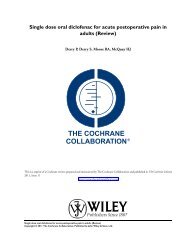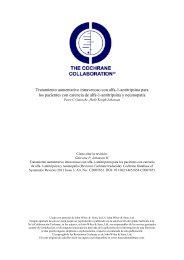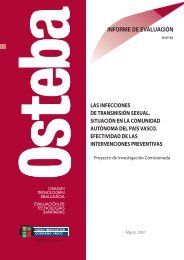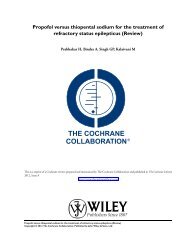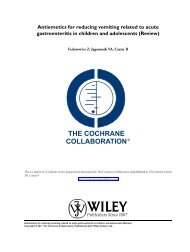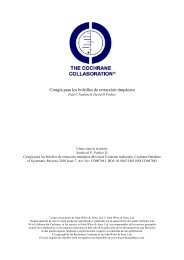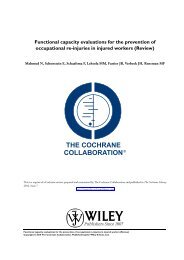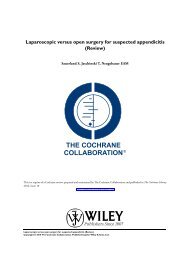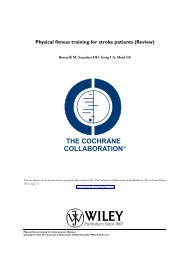Non-pharmacological interventions for caregivers ... - Update Software
Non-pharmacological interventions for caregivers ... - Update Software
Non-pharmacological interventions for caregivers ... - Update Software
You also want an ePaper? Increase the reach of your titles
YUMPU automatically turns print PDFs into web optimized ePapers that Google loves.
Kalra 2004 (Continued)<br />
Judgement: insufficient reporting of reasons<br />
<strong>for</strong> missing data across <strong>interventions</strong><br />
groups to permit judgement<br />
Selective reporting (reporting bias) Low risk All study’s pre-specified outcomes have<br />
been reported<br />
Larson 2005<br />
Methods RCT<br />
Participants Source: the spouses of stroke survivors admitted to the stroke unit at Danderyd University<br />
Hospital, Stockholm, Sweden, between November 2000 and July 2002<br />
Definition of caregiver: not stated<br />
Caregivers’ inclusion criteria: none stated<br />
Caregivers’ exclusion criteria: if it was not possible to obtain in<strong>for</strong>mation from the spouse<br />
Stroke survivors’ inclusion criteria: none stated<br />
Stroke survivors’ exclusion criteria: the stroke survivor was not going to return home<br />
after discharge<br />
Number of <strong>caregivers</strong> randomised: 100<br />
Number of <strong>caregivers</strong> in intervention group: 50<br />
Number of <strong>caregivers</strong> in comparator group: 50<br />
Number of <strong>caregivers</strong> assessed at final follow-up: 91<br />
Number of <strong>caregivers</strong> in intervention group: 46<br />
Number of <strong>caregivers</strong> in comparator group: 45<br />
Mean age of <strong>caregivers</strong>: 67<br />
% male <strong>caregivers</strong>: 20%<br />
Interventions Title: nurse-led support and education programme<br />
Characteristics: education programme, delivered to groups of 10 <strong>caregivers</strong>. Topics covered<br />
included the nature of stroke, treatment and recovery, psychological and social effects<br />
of stroke and prevention of further stroke. Participants were free to contact the<br />
stroke nurse specialist if and when required<br />
Intervention provided by: stroke nurse specialist<br />
Intervention delivered: hospital setting<br />
Dose/frequency/timing of intervention: 6 sessions over a period of 6 months<br />
Intervention length: 6 months<br />
Title: control<br />
Characteristics: routine in<strong>for</strong>mation during stroke survivor’s stay in hospital and at discharge.<br />
A 1.5-hour open session provided by a stroke specialist physician was also available<br />
<strong>for</strong> control group to attend should they wish<br />
First comparator intervention provided by: stroke physician<br />
First comparator intervention delivered: in hospital<br />
Dose/frequency/timing of first comparator intervention: not applicable<br />
Outcomes QOL; Bradley’s well-being questionnaire; LISS questionnaire; EuroQol<br />
Timing of assessment: 6 months; 12 months<br />
<strong>Non</strong>-<strong>pharmacological</strong> <strong>interventions</strong> <strong>for</strong> <strong>caregivers</strong> of stroke survivors (Review)<br />
Copyright © 2011 The Cochrane Collaboration. Published by John Wiley & Sons, Ltd.<br />
27



